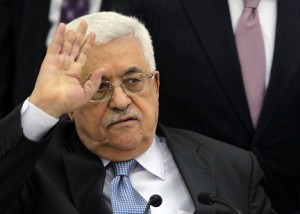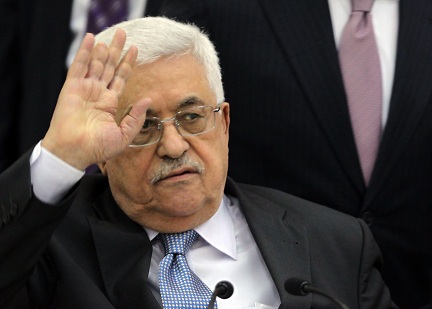
(AFP PHOTO/ABBAS MOMANI)
Escalating political tensions between Palestinians and Israelis are at the top of the agenda in the meeting between President Abdel Fattah Al-Sisi and president of the Palestinian Authority Mahmoud Abbas Wednesday.
Abbas previously met with Egypt’s General Intelligence Service (GIS) director Khaled Fawzy Tuesday. They discussed efforts made in the UN Security Council to end the Israeli occupation of Palestinian territories, as well as joining several international treaties and charters, according to the press office of the Palestinian Embassy in Cairo.
The meeting, attended by Chief Palestinian Negotiator Saeb Erekat and Palestinian General Intelligence chief Maged Farag, also discussed the Palestinian Unity government’s efforts to reconstruct the Gaza Strip, following the major damage that befell it after the 50-day armed conflict last summer.
Palestinian political developments are on the top of the Palestinian-Egyptian meetings’ agenda, according to Mohamed Gomaa, Palestine expert at Al-Ahram Center for Political and Strategic Studies.
Gomaa said that Palestinians taking further steps to internationalise the Palestinian issue is also an important part of that agenda considering the Egyptian officials meetings with international figures who are concerned with peace process between Israel and Palestine. As such, he highlighted the meeting between Al-Sisi and Envoy of the Quartet on the Middle East Tony Blair.
“Egypt will not accept the resumption of talks between Israel and Palestine before stopping Israeli settlement and violations,” Gomaa said.
Palestine was accepted on 7 January into the International Criminal Court (ICC), allowing the Palestinians to pursue war-crimes charges against Israel. Further, Abbas announced earlier this month that the Palestinian Authority will continue trying to push a statehood bid after the Security Council rejected a statehood bid put forth on 30 December.
In his meeting with the Egyptian president Sunday, former British premier Blair expressed his hopes for a push forward in the peace process, and achieving progress between Israelis and Palestinians following the upcoming Israeli elections in March.
Gomaa explained that there is a general Arab accordance on supporting Palestinian choices regarding the Palestinian-Israeli conflict, highlighting recognition of “dangerous consequences of Israeli stubbornness”, and referring to Israel’s security forces storming Al-Aqsa Mosque.
Gomaa asserted that the more steps towards internationalisation that the Palestine Authority takes, the more it will face Israeli punitive measures, and that Arab countries will be responsible for providing a “financial safety net” in that case.
Foreign Ministry Spokesman Badr Abdelatty stressed Egypt’s support for the Palestinian people and their aspirations to establish an independent state with its capital, East Jerusalem.
Jehad Al-Harazin, political analyst and leader in the Palestinian Fatah movement, told Daily News Egypt that Abbas’s discussions with high profile officials in Egypt will include talks regarding creating an Arab financial safety net, as the Palestinian Authority was unable to pay salaries following Israel’s freezing of tax funds in response to Palestine’s decision to join the ICC.
He added that Abbas made announcements regarding re-submitting the statehood bid to the UN Security Council, though talks with Arab leaders have to be held prior to taking this decision.
Regarding negotiations with the Israeli side, Al-Harazin said that Palestinian Authority is not rejecting the negotiations just for sake of rejection. Rather, negotiations will be resumed if certain conditions are met, which include a time frame for the end of the occupation and settlement activity, noting that this is the main reason behind the Palestinians’ pledge to the Security Council.
He added: “We don’t want to spend another 20 years of negotiations without established conditions.”
Additional reporting by Menna Zaki




